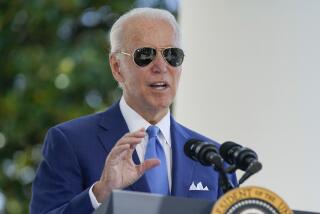Spread of TB from patient unlikely, tests show
- Share via
Laboratory tests of a patient isolated in Denver with a highly drug-resistant form of tuberculosis have found no signs so far of the bacteria in his sputum, an indicator that the chances he could have spread the disease are very low, National Jewish Medical and Research Center said Tuesday.
The three consecutive negative results are the first step toward loosening restrictions on the patient, who has been confined to a hospital room by public health orders.
The patient, 31-year-old Andrew Speaker of Atlanta, has started on an intensive regimen of five or six antibiotics and is doing “quite well,” said Dr. Charles Daley, one of the attending physicians.
Speaker, whose travels when he left to get married in Europe in May sparked an international effort to track down hundreds of people in several countries who may have come in contact with him, is infected with a rare and lethal form of tuberculosis known as extensively drug resistant tuberculosis, or XDR TB.
Tuberculosis is an infection of the lungs characterized by fever, weight loss, night sweats and coughing up of blood.
The disease is spread primarily through microscopic droplets released when an infected person coughs, sneezes or speaks.
Dr. Mario Raviglione, director of the World Health Organization’s Stop TB Department, said Tuesday that researchers had identified the general type of Speaker’s XDR TB. It is a member of the Haarlem family, first identified in the Netherlands in 1999.
Speaker’s strain has not been found before in the United States. Because the Haarlem family is relatively widespread around the world, scientists still are uncertain where he contracted the disease.
Speaker has been held in medical isolation since May 25. He arrived at the Denver hospital Thursday under the first federal isolation order issued since 1963. Local health authorities are now in charge of isolating him.
Dr. Randall Reves, medical director for the Denver Metro Tuberculosis Control Program, said Tuesday that three negative test results are “a good sign,” but not enough for the Denver Health and Hospital Authority to revoke the order.
The agency is waiting to see whether any of the sputum samples grows bacteria in culture over the next few weeks and if follow-up X-rays or CT scans show any change in the lesion in Speaker’s lung, Reves said. “Release from isolation can take weeks, or even several months,” he said.
Also Tuesday, World Health Organization officials said at a news conference that U.S. health authorities appeared to have been slow in alerting airlines and international public health authorities about Speaker.
Fulton County, Ga., health officials knew May 10 that Speaker’s tuberculosis was resistant to first-line drugs and that he intended to travel. He boarded an Air France flight to Paris on May 12.
Because Speaker was potentially infectious, public health authorities should have notified the airline to prevent him from boarding a plane, WHO officials said.
WHO officials were uncertain whether the U.S. Centers for Disease Control and Prevention followed international regulations that require notifying the WHO within 24 hours of discovering a potential international health emergency. The regulations have been approved but do not take effect until June 15, Raviglione said.
CDC officials have said they learned the extent of drug resistance in Speaker’s tuberculosis and began trying to contact him on May 22.
The WHO was notified on May 24.
--






